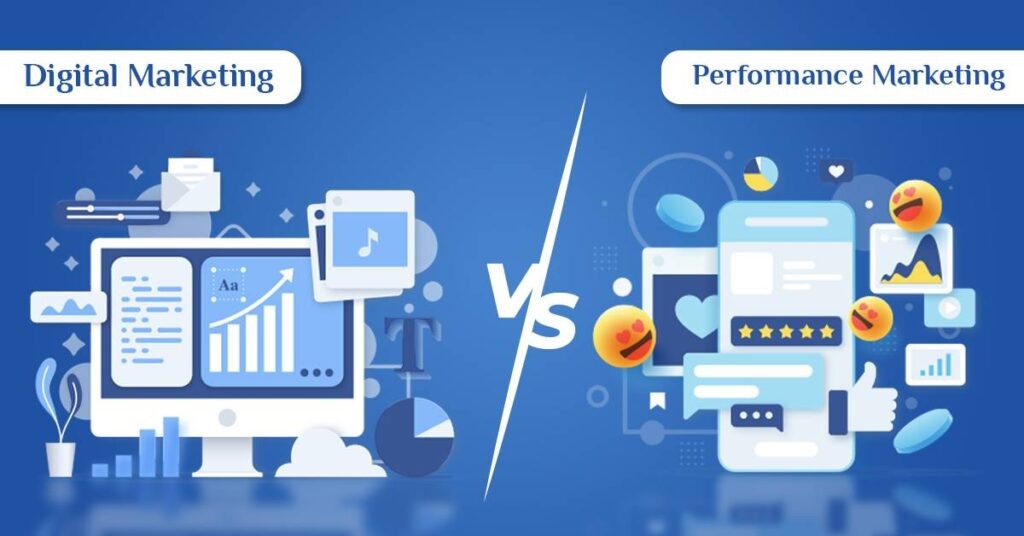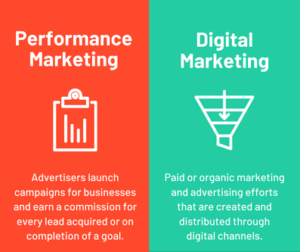Introduction
Marketing has evolved with technology. Two popular types are digital marketing and performance marketing. They help businesses grow but in different ways.
What is Digital Marketing?
Digital marketing uses the internet to promote products or services. It includes various strategies and tools.
Common types of digital marketing include:
- Search Engine Optimization (SEO): Improves website ranking on search engines.
- Social Media Marketing: Promotes products on social media platforms.
- Email Marketing: Sends promotional emails to potential customers.
- Content Marketing: Creates and shares valuable content.
- Pay-Per-Click (PPC): Runs ads where you pay each time someone clicks.
What is Performance Marketing?
Performance marketing focuses on measurable results. Businesses pay for specific actions, not just views or clicks.
Key components of performance marketing include:
- Affiliate Marketing: Partners promote your products for a commission.
- Cost Per Acquisition (CPA): You pay when a specific action is completed.
- Cost Per Click (CPC): You pay for each click on your ad.
- Cost Per Lead (CPL): You pay for each lead generated.
- Cost Per Mille (CPM): You pay per thousand impressions.
Key Differences between Digital Marketing and Performance Marketing
| Aspect | Digital Marketing | Performance Marketing |
|---|---|---|
| Focus | Brand awareness and engagement | Measurable results and conversions |
| Payment Model | May involve fixed costs | Pay for specific actions |
| Metrics | Views, clicks, shares | Leads, sales, conversions |
| Tools | SEO, Social Media, Email | CPA, CPC, Affiliate Marketing |
| Strategy | Long-term growth | Immediate results |
Benefits of Digital Marketing
- Reaches a large audience
- Builds brand awareness
- Engages customers
- Cost-effective
- Measurable results
Digital marketing helps you connect with your audience. It can build trust and loyalty. This can lead to long-term success.

Credit: www.linkedin.com
Benefits of Performance Marketing
- Low risk
- Measurable results
- Budget-friendly
- Targeted approach
- Higher ROI
Performance marketing ensures you pay for actual results. This can make your marketing budget more effective.

Credit: dotinacademy.com
Which One Should You Choose?
Choosing between digital marketing and performance marketing depends on your goals. If you want to build brand awareness, digital marketing is the way to go. If you need immediate results, performance marketing might be better.
Many businesses use a mix of both. This way, they can build a strong brand while also achieving specific goals.
Frequently Asked Questions
What Is Digital Marketing?
Digital marketing uses online channels to promote products or services, including social media, email, SEO, and content marketing.
What Is Performance Marketing?
Performance marketing focuses on measurable results, like clicks, leads, or sales. Advertisers pay based on these specific outcomes.
How Are Digital And Performance Marketing Different?
Digital marketing is broad, covering all online efforts. Performance marketing is specific, emphasizing measurable results and return on investment (ROI).
Which Is Better: Digital Or Performance Marketing?
Neither is inherently better; it depends on your business goals. Use digital marketing for brand awareness and performance marketing for measurable results.
Conclusion
Digital marketing and performance marketing each have their strengths. Understanding the differences can help you choose the right strategy. With the right approach, you can achieve your marketing goals.


